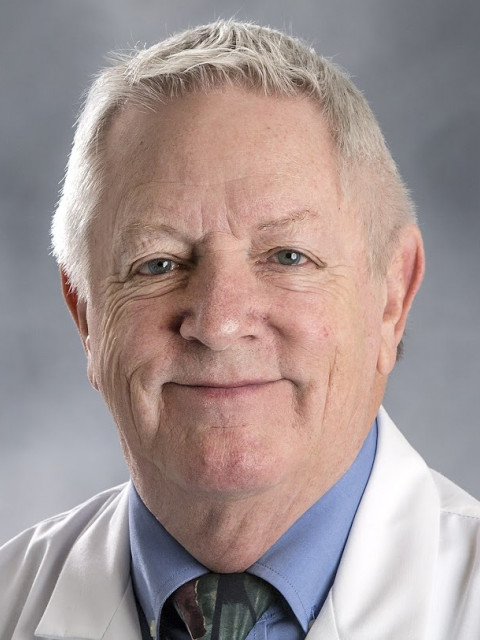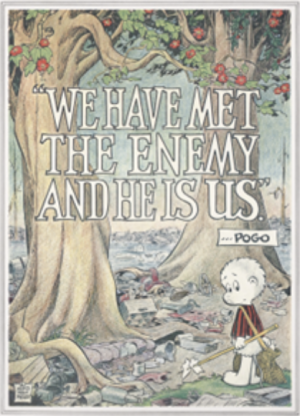
What Can I Say? More Questions than Answers
by Gerald Blackburn, DO, MACOI
August 12, 2024

"We Have Met the Enemy and He is Us" was originally published by Walt Kelly in 1970 for Earth Day. The echoes of his concern for and vision of the future remain just as true today, if not more so. I truly don’t remember when the accuracy of Mr. Kelly’s cartoon registered with me as prescient, but it now resonates with me almost daily as I think about the future we are leaving to our children, grandchildren, and future generations.
On a personal level, I have been fortunate enough to have lived more than a few years. I have witnessed the impact of climate change in Michigan when I drive by the backyards where skating rinks no longer exist; where pond hockey no longer has reliable ice; shortened winters; and the expanding impact of climate change on the differential diagnoses that I must now consider in my consultations.
As an infectious disease physician, a thorough travel history is more challenging than ever. Numerous infectious agents are now reported far outside their usual confines as the result of changes in weather patterns including shorter winters, longer summers, extreme heat, wildfires, drought, flooding, hurricanes, and other extreme weather events. Many of these infections are life-threatening or otherwise life-changing, either because they are not considered in the differential, leading to a delay in diagnosis, or because they are not otherwise treatable. Malaria, Zika, Chikungunya, Dengue, numerous tick-borne infections including Lyme, Ehrlichiosis, Babesiosis, and Powassan virus are just a few examples of diseases that have expanded their reach due to environmental changes.
So, what can I say to my colleagues to get them to appreciate the impact of climate change on their practice? On their friends and family? How do I express to my colleagues how critical it is for them to maintain their credibility as scientist-physicians when they discuss the impact of climate change with their patients, or the public at large?
What can I convey to my colleagues that will stimulate them to lead the public towards understanding the threat of climate change on infectious diseases and see that we all have a role in mitigating further change?
What can I say to get them to understand that climate change is real, likely to only get worse, and if they are not willing to push these issues, who will? How else to explain Candida auris, a relatively new fungal species, initially described from a patient in Japan in 2009, but now reported from numerous countries, genetically unrelated to the initial isolate in Japan. This species can be deadly, incredibly difficult to treat and once in your health care facility (ICUs, SARs, ECFs), almost impossible to eradicate.
How else to explain a newly described fungus, out of China, R fluvalis (Nature Microbiology, June 19,2024), that, similar to C. auris, appears highly pathogenic and highly resistant to current antifungals. Not your problem? Try telling that to the family watching their loved one die in the ICU from hospital-acquired, untreatable fungemia.
How else to explain reports of Naegleria - a deadly amoeba with a nearly 100% fatality rate associated with CNS infections from swimming - now reported from more northerly states than ever previously seen. Not your problem? Try telling that to the parents of that dying child.
How else to explain severe, even deadly, Vibrio vulnificus infections in more northerly ocean waters than previously described. Not your problem? Try explaining that to your patient soon to lose his/her arm or leg - or life - as a result of this infection.
HANTA virus was found in Michigan in 2021. There has been an increase in cases, including fatalities, in Arizona this year (2024) as the rodent population increases due (possibly/presumably) to climate change. Never heard of it? Time to learn more as even if you don’t practice in the Southwest, you or your family or your patients might have traveled there.
Many scientists, far smarter and more informed than I, saw the potential impact of climate change and other environmental issues as early as Mr. Kelly and, certainly in the ‘80s, feared for the world in which we are now living. This didn’t have to happen, but it is now our reality. Should I be screaming about this from a soapbox or quietly, gently nudging my fellow physicians to understand their roles in what lies ahead?
As physicians, we have the opportunity, or perhaps obligation, to educate both our colleagues and our patients as to the impact of climate change on all of us. Though we are already dealing with the impact, I can only hope that confronting these concerns, as well as educating our colleagues and our patients, will help mitigate the impact upon those that follow us. We owe it to our children and future generations to do so.
What more can I say?
Note: The views expressed in this article are the author’s own and do not necessarily represent the views of ACOI.

